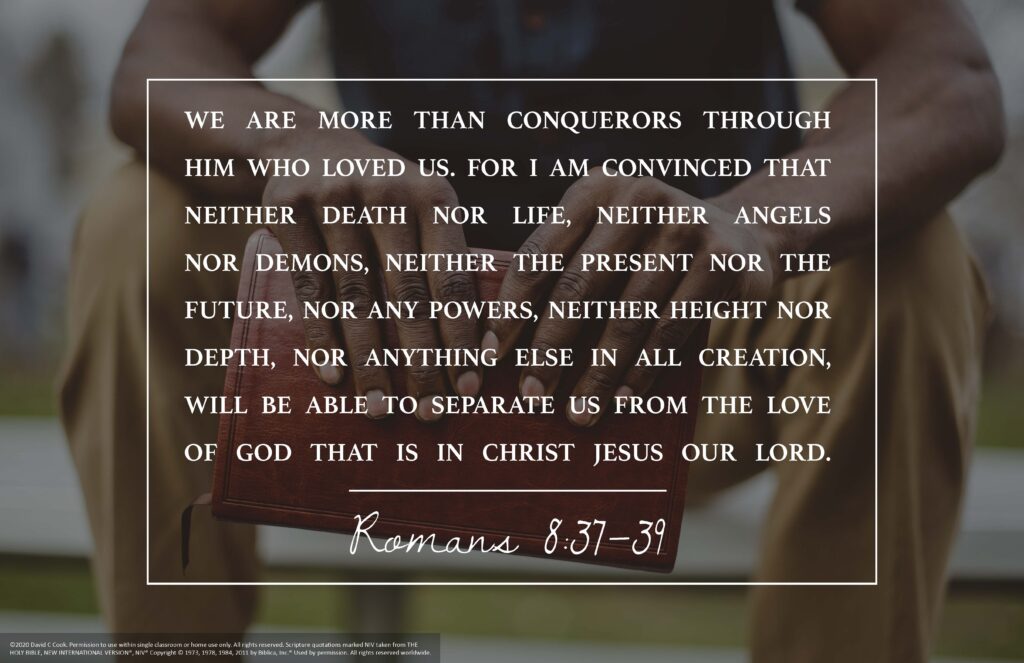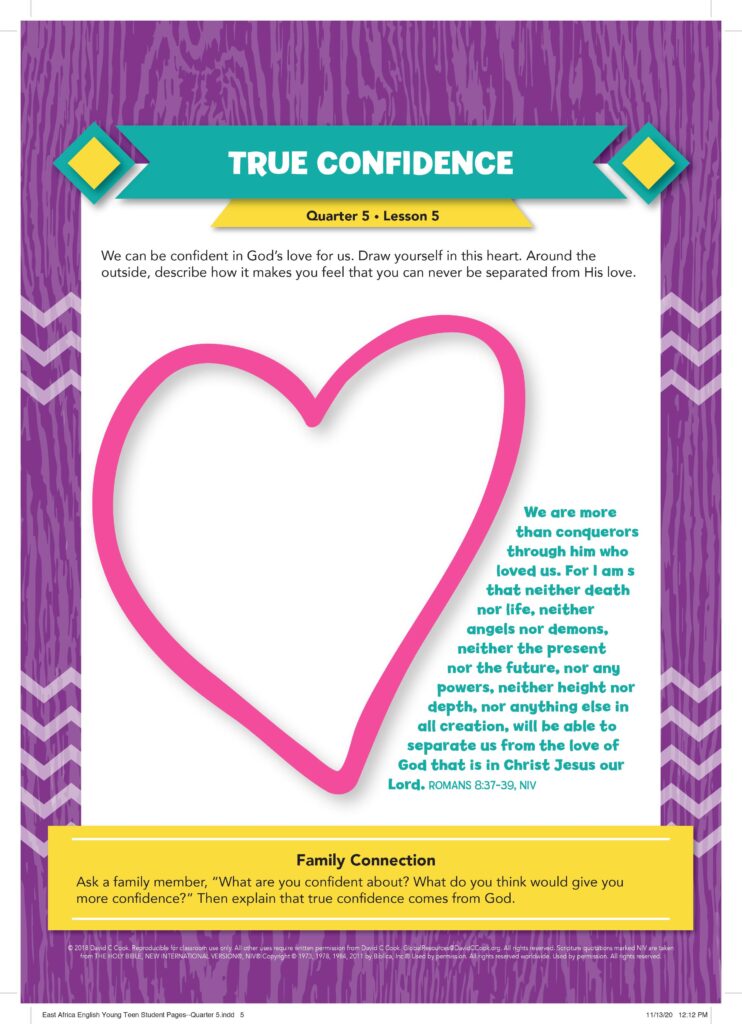During the lesson, the information for you to know is written in regular type, and what we suggest speaking or reading aloud to children is in bold. All resources for this lesson, including the Teacher Guide, Student Page, Family Connection Card, and other resources can be downloaded in a ZIP file by clicking on the following link:
In some lessons you will find "resource articles." These are articles written by experts from around the world to help equip you for your work with children and adolescents. Share them with parents or guardians if you consider it appropriate.
So you are no longer a slave, but a son, and if a son, then an heir through God.
Galatians 4:7
Who is God? And who am I? These simple questions can be hard to answer. But the Bible is clear on this point—you are a beloved child of the Most High King! You are precious and valuable to Him—so precious that He has made you an heir to His eternal kingdom! That truth should determine who you are and how you see yourself. But sadly, you may have believed some of the lies that steal your confidence. You may have been told you that you are worthless, useless, or unlovable. You may see your failures and weaknesses as proof that these lies are true.
But be encouraged! Learning to see yourself as God does is a lifelong journey. Your confidence can rest in God! When you know and believe the truth of who He is and who you are in Him, you can stand confident even in the most difficult situations. May you live each day with the confidence that you are God’s beloved, chosen one—and that nothing can separate you from His love!
Encourage the students to ask family members, “What are you confident about? What do you think would give you more confidence?” They can then explain that true confidence comes from God.
Teacher Tip: If possible, email or text the Family Connection Card to the families of your students.
Greet your students by name as they arrive. Try to share a specific compliment with each one to show that you care. Be sure the compliments are based on their character or value as people, not on their outward appearance or their skills. For example, you can share that a student is kind because he always helps others or that a teen is patient because she always waits for others to finish talking before she speaks.
Students may answer that confidence is the positive way we think and feel about ourselves. They may say it is believing that we are valuable, talented, and able to do something well. Students may mention the term “self-confidence” or believing in yourself and your abilities.
I will say some things you may or may not feel confident about. When I say each one, stand up if you feel confident about the statement. If you do not feel confident, remain seated.
Read the following statements out loud. Pause after each to allow the students to respond. Then ask them all to be seated before reading the next statement.
Most people are confident about some things but not everything. For example, someone may feel confident that he can ride a bicycle well or when he is with younger children. But he may not feel confident about his abilities in school or when he is around teens his own age.
Some people seem very confident. They feel good about themselves and believe they can be successful. Others have little confidence and feel like they cannot do anything well. Sometimes, people who seem to have confidence are actually struggling with low self-worth. They may pretend to be confident to hide that they really feel less valuable than those around them.
It is important to develop confidence. Being confident can help you to handle difficult situations, get along well with others, make good choices, contribute to our communities, and live a happier and more fulfilled life. It can even make you healthier and more successful in life. Whether you have confidence in yourself and your abilities or not, you can build up your confidence and learn to be a more confident person.
Developing confidence is a lifelong journey. You cannot change the way you feel about yourself and your abilities in a single day. For most people, it takes a lifetime to learn to love and accept themselves the way they are. But you can begin the journey by working little by little to do things to help you to become a more confident person.
Even when we build up our confidence, we will still have moments or days when we do not feel confident. No matter how confident we are, we still make mistakes. When we only have confidence in ourselves, our confidence may disappear when we fail or are going through a difficult time. The only way to have confidence that does not disappear is to place our confidence in God. When we believe the truth about who God is and who we are in Him, we can have confidence all the time.
Divide the students into 4 groups. Tear out the Bible verse and tips pages at the end of this lesson. Give each group 1 section to discuss. (If you have a large class, more than 1 group can discuss each verse and tip.) Students will begin with the Bible verses. The verses and questions are provided here for your reference.
Identity statement: You are chosen by God.
But you are a chosen people, a royal priesthood, a holy nation, God’s special possession, that you may declare the praises of him who called you out of darkness into his wonderful light.
1 Peter 2:9
Identity statement: You are beloved by God.
See what great love the Father has lavished on us, that we should be called children of God! And that is what we are!
1 John 3:1a
Identity statement: Nothing can separate you from the love of Christ.
Show the Memory Verse poster if you are using it.
Who shall separate us from the love of Christ? Shall trouble or hardship or persecution or famine or nakedness or danger or sword? … No, in all these things we are more than conquerors through him who loved us. For I am convinced that neither death nor life, neither angels nor demons, neither the present nor the future, nor any powers, neither height nor depth, nor anything else in all creation, will be able to separate us from the love of God that is in Christ Jesus our Lord.
Romans 8:35, 37–39

Identity statement: Christ has made you new.
Therefore, if anyone is in Christ, the new creation has come: The old has gone, the new is here!
2 Corinthians 5:17
As the groups work on their Bible identity statements, walk around and listen to the groups. Offer help if needed. After a few minutes, ask each group to briefly share their statement and how it would help build confidence. Have the students remain in their groups.
The Bible tells us that when we believe in Jesus and accept Him as our Saviour, we become God’s children. God has chosen us, and He loves us deeply. Nothing can separate us from His love. In Him, we are made new, and all our mistakes, failures, weaknesses, and flaws are forgiven.
When others tell you lies about who they think you are, you can remember the truth that you have been chosen by God to be His special possession. When you feel worthless, you can remember the truth that you are loved by the almighty, powerful Creator of the universe. When you feel useless, you can remember the truth that nothing you do can ever separate you from the love of Christ. And when you feel like you are not worthy of being loved or forgiven, you can remember the truth that you can be made new in Christ. You can always be confident in who God is and who you are in Him!
A great practical way to build confidence is to try new things or to try to improve in something you already know how to do. Let’s look at some practical tips that can help build your confidence.
Ask the groups to look at the practical tips on their slips of paper. The groups will read the tips and answer the questions together. The tips are provided here for your reference.
Give the groups 3–4 minutes to discuss their answers. Ask each group to share an example they discussed.
All of us struggle with confidence. We know we are flawed and imperfect. We know we make choices that hurt us and others. Our confidence in ourselves disappears when we fail. But when we become children of God, we no longer need to base our confidence on our own successes and failures. Instead, we begin to see ourselves as God does—as His precious, loved, chosen children.
At the beginning of the lesson, we stood when we heard statements about ourselves that we are confident about. Though we can still be confident about those same things, we can have a stronger foundation for our confidence—God and His love for us. Now I will say some statements about who God is and who you are in Him. If you have confidence that a statement is true for you, stand. I will pause after each statement so you can think of how that can help you have confidence in your own life.
If you are not sure if you have confidence in God, you can remain seated. If you still have questions, you may come to see me after class.
Read the following statements, pausing after each for the students to stand and think of a way this statement affects their lives. The students do not need to sit down between statements.
These statements are unchanging truths because they are based on God. They are not based on your feelings, your actions, or circumstances or what others do to you. Because these statements of truth are what God says, they can be the basis for your confidence!
Optional: If you are using the Student Pages, the teens can complete the activity on their pages.

Close with a blessing based on Romans 8:37–39:
Blessing: May you have confidence that you are more than a conqueror through God’s love for you. May you remember that neither death nor life, nor angels nor demons, nor things present nor things to come, nor powers, nor height, nor depth, nor anything else in all of creation, will separate you from His great love!
Lead the teens in singing this quarter’s song, if possible.
Life on Life ©2020 David C Cook. Reproducible for home or classroom use only. All other uses require written permission from David C Cook [email protected]. All rights reserved.